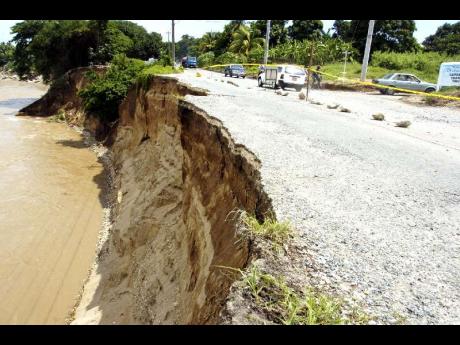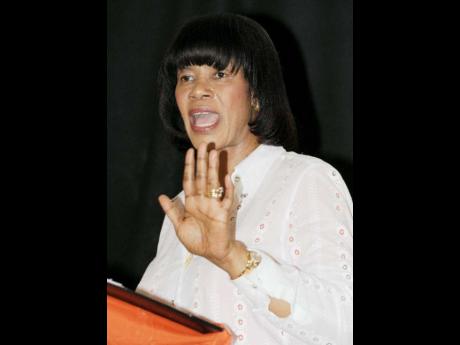'We faced this united'
A.J. Nicholson, Contributor
President Piñera of Chile advised the world at the end of the rescue mission to bring the trapped miners to the surface: "We faced this united." That was the platform on which the success of that near miraculous operation was erected. All mankind watched in awe as the spirit of togetherness took a firm foothold in northern Chile, and we witnessed a prime example of the ingenuity and fixity of purpose that can be exhibited by the better side of homo sapiens.
Portia Simpson Miller, the leader of the opposition here in our homeland, has now suggested, in the House of Representatives, that, in the present situation of a battered and bruised Jamaica, it would be best that a broad-based committee be established to oversee the massive rehabilitation programme that has become necessary as a result of the devastation caused by the activities of the forces of nature. The prime minister intimated that the suggestion is worthy of consideration, and it must be acknowledged that, if forward-looking action is taken on that proposal, it could signal an understanding and acceptance of an agenda for progress.
Not many people, however, would perhaps be willing to wager that the present administration would warm to such a recommendation. The body of evidence concerning its modus operandi during its tenure, so far, points directly in the opposite direction. From the beginning, the prime minister's rejection of weighty encouragement to the contrary in his approach to the appointment of a new solicitor general in 2007 ushered in a 'we know best' attitude that continues to haunt the Government and the entire body politic.
And, it was not an approach that could serve Jamaica well, for it smacked of the kind of victimisation and wrong-headedness which has dogged the administration in its handling of issues related to the machinery of government, including those issues which touch and concern the operations of the public service. It is, therefore, going to be extremely difficult for the Government to shake off that earned reputation as it pursues its public-sector modernisation plan. Indeed, it was this aura of bias and victimisation which threatened to envelop the road-rehabilitation project of the Jamaica Development Infrastructure Programme. The ravages of the forces of nature must certainly now push the Government to revise its approach to the implementation of that initiative.
Opportunity
Of course, this is not the first opportunity that nature has presented to this government to adopt an inclusive approach. We recall the unprecedented level of prolonged rainfall that attended the assumption of power by the new regime in the last quarter of 2007. The heavens wept without pause. That unusual phenomenon, coupled with the onrushing global economic meltdown, impelled the opposition leader to recommend that the Government seriously consider the development of a special plan to deal with the expanding challenges and anguish that the less fortunate among us had to deal with on a daily basis.
We recall, also, that the prime minister did not seek to inquire of the leader of the opposition as to what she had in mind. Instead, he dashed headlong to publicly express his unkind thoughts as to what he perceived to be residing in her head. That was an unkind and unworthy approach to governance which, up to this point in time, has not witnessed any change of attitude on the part of the present regime. Any recommendation coming from any quarter, in particular, from the parliamentary Opposition, is seen by them as a trap and an attempt to cause embarrassment to a government which responds positively only when its back is against the wall.
Regardless, the devastation caused by the recent heavy rainfall presents yet another opportunity for the administration to bring a sense of justice to the management of the road-rehabilitation programme. The recommendation by the opposition leader is not only just and sensible, but a positive response to the idea could mark the strengthening of the way to allowing for the inputs that are required to be received from the people for meaningful decision making in a well-ordered democracy. It seems like light years ago that the prime minister campaigned on that strong platform of inclusiveness and transparency.
Subject matter
The issues that arise from the suggestion made by the leader of the opposition could form the subject matter of the kind of motion that a discerning, visionary upper chamber of parliament would debate and make strident recommendations. That chamber - in Jamaica's case, the Senate - is a body which ought not to experience the sharp political divide that tends to characterise the deliberations of a lower house. The House of Representatives is made up of individuals who win their places as a result of hard campaigning in competitive parliamentary election proceedings, unlike the membership of the Senate. The upper house is essentially meant to be a review chamber, bringing to its deliberations a far less competitive atmosphere, seeking conciliation and, in substance, exerting pressure towards arriving at consensus.
Change course
Our present upper chamber has to change course and adopt a new approach by returning to its core functions. In the first place, it has to meet with more frequency; its sittings are far too sporadic; for example, it has not had a sitting since July. It has failed to place its stamp on the processes of governance in our country, and it cannot be denied that there is an unfortunate lack of perceptive leadership. There is the strong view that the Senate is hopelessly compromised. Not only did the government senators applaud the activities of the prime minister in the recent extradition imbroglio, when he himself acknowledged wrongdoing and sought to apologise to the nation, but they also rejected and dismissed out of hand a recommendation of the opposition senators that an independent commission be established to inquire into the entire affair.
The machinery of government is made up of several distinct elements. If any one of those parts fails to address and carry out its core functions, the proper operation of the engine is stymied. In response to the latest plea of the leader of the opposition for a new inclusive and transparent way to be found to set about the task of tackling the rehabilitation programme, a responsible Senate could make several recommendations in urging that the government answer the call positively. The upper house would certainly be performing its role as a review chamber, making suggestions that give rise to consensus building.
A first recommendation could be that, following on the establishment of a broad-based committee to superintend the programme, parish sub-committees be put in place to receive the input of parishioners. This would not only remove the debilitating partisan political sting from the activity, but it would also provide the residents themselves with an opportunity to assist in the prioritisation process, so that all would be on board as to the sequence of addressing the rehabilitation of the roads in their respective communities.
A second suggestion could relate to the composition of the overarching committee and the parish sub-committees. Of course, the representatives of the people could not be sidelined in these activities; after all, they were elected as standard-bearers. Those representatives should, however, be made to understand from the outset that their word and their recommendations would not necessarily carry the day, but must be regarded as only one element of all the ideas that would contend to arrive at an acceptable outcome.
And, the senators could also make suggestions as to how the implementation process would benefit from the engagement of representatives of the parish committees in monitoring the exercise. These urgings of the upper house would push the government and opposition towards a united approach in the rehabilitation that has become a paramount consideration for all our citizens. As President Piñera of Chile advised the world at the end of the rescue mission to remove the trapped miners from their prison far below the Earth's surface, "We all were part of the miracle; we are a more united country."
The "miracle" of faraway northern Chile can be allowed to resonate here in our homeland. It could hardly be doubted that Jamaica has to be rescued from the culture of divisiveness that has been allowed to take root for far too long. And so, who will bell the cat? There could be a sound beginning with a positive response to the suggestion put forward by the leader of the opposition.
There is no reason to perceive any oblique motive in the recommendation that she has made. It is an eminently sensible and logical suggestion which should be allowed to germinate and ultimately bear the kind of fruit that will lead all Jamaica to say with one voice: "We faced this united." How else can VISION 2030 be moved to become a reality?
A.J. Nicholson is opposition spokesman on justice. Feedback may be sent to columns@gleanerjm.com


